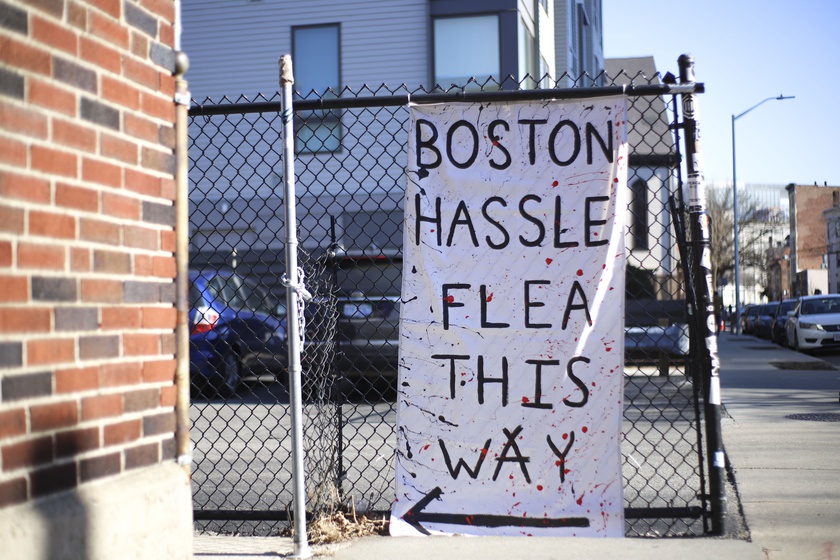I follow a path of freshly plucked rose petals into the dim, mood-lit basement of Elks Lodge in Central Square. “Adicto Del Rock” by the Mexican garage-rock band Las Ultrasónicas blasts in the background, and the sweet, slightly piercing scent of IPA beer wafts into my nose. Pivoting away from the hustle of Massachusetts Avenue, my friend and I make our way toward the bi-monthly art and flea market of Boston Hassle, a volunteer collective that showcases the work of independent and underrepresented creative scenes in the greater Boston area.
I step into the flea market as some of the vendors set up shop. The market consists of two floors, vendor tables neatly arranged into concentric squares in each one. Sophie L. Yarin, the editor-in-chief of Boston Hassle, told me in our interview the day before that the flea market has “a mission of affordable art by people, for the people.” It is supposed to provide a space where you can buy things “made by, you know, your friend, your barista, the person next to you on the T.”
{shortcode-4a2c40221de25e3580611c6d679d4b3eaf51760f}
The lodge is full of eccentric stands, ranging from vintage resale clothing racks — where I find a red auto repair shop coverall tagged “VINTAGE WORK JACKET FOR WRENCHIN’ ON YA CAH” — to myriad independent artists selling their work. Vendors peddle screenprints, acrylic pour canvas paintings, repainted vinyl records, and an infinite variety of earrings: leather, upcycled metal, various loose singlets. “It’s a created space that allows us to, again, create a small measure of the sort of metaphysical infrastructure,” Yarin says. “It’s regenerative.”
Before I interview Sharon A. Crowley of Handsome Hobo Neckwear — a small business that sells ties, bowties, and ascots made by Sharon’s husband, Rick Crowley — I meet their “Director of HR” Kiwi Mermaid Crowley, a black pug in a fashion-forward get-up. (There is also a baby Yoda outfit behind the table.)
After speaking with Sharon about water filters, slurpees, and dogs sensing cancer, and with Rick about how their business grew out of him serendipitously selling his bowtie during a job interview, they gift me with a handmade ascot: black-and-white with skeletal anatomy patterns on one side and red vertical stripes on the other. When I ask why they chose Hassle, they agree, “We liked the art vendors and wanted to become part of the community.”
Publisher of Boston Hassle Dan J. Shea says he hopes the collective is a space “where young artists, where experimental artists, where boundary-pushing artists can do their work, where they can stumble and fall and get back up again and try more. We're where people can learn to become the great artists that we want to see coming out of Boston.”
Yarin says that, for her, part of Hassle’s value lies in “the way we show Boston in all its trashy, shitty, hardscrabble glory.”
“We're getting gobbled up — this town's getting gobbled up by rich condos and corporations,” Shea says. What frustrates him is that “these towns are so broken politically, and being broken politically is stifling and snuffing out these creative people from being able to live here.”
Hassle is creating a “fertile breeding ground for getting folks involved,” and that the “market is a place where a bunch of scenes come together,” Shea says.“These kinds of scenes are places where there's a political latency that is just waiting to be stirred. They just need the right person, situation, something to happen to them or their friend, for the fire to light up.”
With hopes to eventually set up a brick-and-mortar building from which they can promote their art and music shows, operate their website and publication, and even potentially host the bi-monthly flea market, Boston Hassle feels destined to establish themselves as a “third space,” as Shea would call it.
“You live somewhere, you work somewhere, and then there's the third space,” Shea says. “This is where you go and spend your time. And you spend your social life there. You go there for fun, you go with friends.” This, ultimately, is Shea’s mission: “the business of creating third spaces.”


